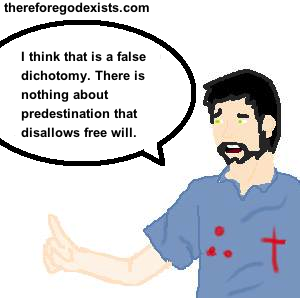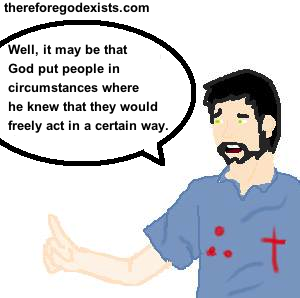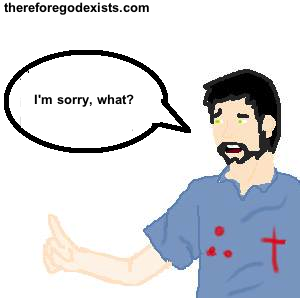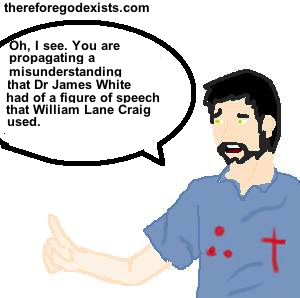 There is a growing trend among Christians to deny philosophical reflection upon complicated issues. It is an unfortunate state of affairs in the evangelical church that many people are repelled by intellectual discourse. As a consequence of this, many Christians find themselves holding the position that either predestination is true, or free will is true. But it cannot be both. For how could we be free if God predestined everything to occur? Further, if God knows everything, how could it be the case that we have free will? For obviously, God knows with certainly that I will perform a certain action at 3 o’clock on Saturday. That is established as an absolute fact in the future. Does it therefore follow that I have no freedom to choose what I will do on Saturday? Am I being compelled to do this? Many think that since God knows that it will occur, that the answer is, yes, you are being compelled to do it. The question is, does God micromanage us, or do we have free will? Even in light of God’s foreknowledge?
There is a growing trend among Christians to deny philosophical reflection upon complicated issues. It is an unfortunate state of affairs in the evangelical church that many people are repelled by intellectual discourse. As a consequence of this, many Christians find themselves holding the position that either predestination is true, or free will is true. But it cannot be both. For how could we be free if God predestined everything to occur? Further, if God knows everything, how could it be the case that we have free will? For obviously, God knows with certainly that I will perform a certain action at 3 o’clock on Saturday. That is established as an absolute fact in the future. Does it therefore follow that I have no freedom to choose what I will do on Saturday? Am I being compelled to do this? Many think that since God knows that it will occur, that the answer is, yes, you are being compelled to do it. The question is, does God micromanage us, or do we have free will? Even in light of God’s foreknowledge?
 Further, and perhaps even more profoundly, what about the issue of predestination? The biblical data affirms that God predestines every event to occur. Many take this to be a doctrine of micromanagement. That is to say that as the Calvinist theologian, Doctor Edwin Palmer wrote in his book The Five Points of Calvinism, “God decides and causes all things to happen that do happen… He foreordained everything ‘after the counsel of his will’ (Ephesians 1:11), the moving of a finger, the beating of a heart, the laughter of a girl, the mistake of the typist, even sin.” If that were the case, then it seems unquestionably so that mankind is bereft of freedom of the will in the classical sense. But is that the only acceptable model of predestination? Do we have to believe that God has programmed everything to occur if we are going to believe in predestination? I do not think so. Where will that leave free will? Does God micromanage us, or do we have free will? Well, God could have predestined everything in a different way that aligns with freedom of the will.
Further, and perhaps even more profoundly, what about the issue of predestination? The biblical data affirms that God predestines every event to occur. Many take this to be a doctrine of micromanagement. That is to say that as the Calvinist theologian, Doctor Edwin Palmer wrote in his book The Five Points of Calvinism, “God decides and causes all things to happen that do happen… He foreordained everything ‘after the counsel of his will’ (Ephesians 1:11), the moving of a finger, the beating of a heart, the laughter of a girl, the mistake of the typist, even sin.” If that were the case, then it seems unquestionably so that mankind is bereft of freedom of the will in the classical sense. But is that the only acceptable model of predestination? Do we have to believe that God has programmed everything to occur if we are going to believe in predestination? I do not think so. Where will that leave free will? Does God micromanage us, or do we have free will? Well, God could have predestined everything in a different way that aligns with freedom of the will.
 If God knows that I will do something, am I still free in doing it? The question has led many Christian thinkers to deny either foreknowledge or freedom of the will, sacrificing it to their theological system. When somebody sacrifices God’s omniscience, they are saying that God is not really all-wise. He does not know the truth value in all of the possible propositions. Thus, they have conjured up a conception of God that borders on idolatry. It is a sacrifice to the character of God for the sake of their theological system. In the name of preserving freedom of the will, some will suggest that God does not know what will happen in the future. But I think that this is an unjustified concession.
If God knows that I will do something, am I still free in doing it? The question has led many Christian thinkers to deny either foreknowledge or freedom of the will, sacrificing it to their theological system. When somebody sacrifices God’s omniscience, they are saying that God is not really all-wise. He does not know the truth value in all of the possible propositions. Thus, they have conjured up a conception of God that borders on idolatry. It is a sacrifice to the character of God for the sake of their theological system. In the name of preserving freedom of the will, some will suggest that God does not know what will happen in the future. But I think that this is an unjustified concession.
 It may be the case that God’s foreknowledge is something like a thermometer. That is to say that it accurately reflects what is going to happen. But it has no causal potency. God knows what will happen, but his knowledge is not causing anything to happen. In this way, God’s knowledge is based upon human decisions. If you eat pizza at three o’clock on Saturday, God foreknows that. But if you choose to play basketball instead at 3’clock on Saturday, God would have known that. So whatever decision you choose to make at 3 o’clock on Saturday, God would have known it. Does God micromanage us, or do we have free will? Well the fact that God knows everything should not give us pause. This model that I have presented preserves human freedom and divine foreknowledge.
It may be the case that God’s foreknowledge is something like a thermometer. That is to say that it accurately reflects what is going to happen. But it has no causal potency. God knows what will happen, but his knowledge is not causing anything to happen. In this way, God’s knowledge is based upon human decisions. If you eat pizza at three o’clock on Saturday, God foreknows that. But if you choose to play basketball instead at 3’clock on Saturday, God would have known that. So whatever decision you choose to make at 3 o’clock on Saturday, God would have known it. Does God micromanage us, or do we have free will? Well the fact that God knows everything should not give us pause. This model that I have presented preserves human freedom and divine foreknowledge.
 We all recognize that we are making decisions. Do you recall the worst decision that you ever made in your entire life? Do you ever reflect on your actions and wonder what brought about such an asinine statement or action? You could have easily averted that by simply saying or doing something different. As we retroactively look into the past, we recall the various decisions that we have made. If we were having a bad day and somebody crosses our path, we might have thoughtlessly snapped at this individual. But after a careful recounting of the event and our actions, we would go to that person and apologize to them. These are two decisions that we may recall making in our life. We remember the careful thought that was put into them and the various emotional factors at play. Whether we chose something that seemed selfish or selfless, we recognize that decisions are made. Our lives seem to be a series of choices. Even today, everything you do is based on decisions that you must make. You are presented with a vast range of decisions and you may choose any of them.
We all recognize that we are making decisions. Do you recall the worst decision that you ever made in your entire life? Do you ever reflect on your actions and wonder what brought about such an asinine statement or action? You could have easily averted that by simply saying or doing something different. As we retroactively look into the past, we recall the various decisions that we have made. If we were having a bad day and somebody crosses our path, we might have thoughtlessly snapped at this individual. But after a careful recounting of the event and our actions, we would go to that person and apologize to them. These are two decisions that we may recall making in our life. We remember the careful thought that was put into them and the various emotional factors at play. Whether we chose something that seemed selfish or selfless, we recognize that decisions are made. Our lives seem to be a series of choices. Even today, everything you do is based on decisions that you must make. You are presented with a vast range of decisions and you may choose any of them.
 Thus, as we venture through life, we grasp this concept of autonomy. It seems to be a properly basic belief. It is something that we presuppose in our daily life. It is part of the foundation upon which the rest of our beliefs rest. We believe in freedom of the will because it is something that we can all intuitively recognize. For obviously I am making a choice to open my laptop and write this article. I could have plausibly not opened my laptop and read a book. I could have done that. There is nothing illogical or infeasible about that proposition. There are a number of options instantly available to me. It seems properly basic to recognize this conception of freedom of the will. Therefore, unless you can provide an overriding defeater, then I am justified in believing in freedom of the will. Does God micromanage us, or do we have free will? Well, if we do not, then the entire world is a vain spectacle. It is a charade. It is a show that God has put on for us.
Thus, as we venture through life, we grasp this concept of autonomy. It seems to be a properly basic belief. It is something that we presuppose in our daily life. It is part of the foundation upon which the rest of our beliefs rest. We believe in freedom of the will because it is something that we can all intuitively recognize. For obviously I am making a choice to open my laptop and write this article. I could have plausibly not opened my laptop and read a book. I could have done that. There is nothing illogical or infeasible about that proposition. There are a number of options instantly available to me. It seems properly basic to recognize this conception of freedom of the will. Therefore, unless you can provide an overriding defeater, then I am justified in believing in freedom of the will. Does God micromanage us, or do we have free will? Well, if we do not, then the entire world is a vain spectacle. It is a charade. It is a show that God has put on for us.
 Is God still sovereign? Some think that if we have freedom of the will, then we are intractable and God just cannot rein us in. We are out of God’s control, and hence he is just not in charge of the world anymore. We are in charge. We have frustrated God’s plans. We are laughing maniacally as God desperately tries to put the pieces of his broken world back together. But we will just not cooperate with his plans. We will not allow him to put the pieces back together. God cannot stand against our almighty will. We have finally won. We have stolen God’s world from him, and he had better back off. It is our world now. Is that what we mean when we say that we have free will? Some people think that. Some people think that this is the concomitant of mans’ free will.
Is God still sovereign? Some think that if we have freedom of the will, then we are intractable and God just cannot rein us in. We are out of God’s control, and hence he is just not in charge of the world anymore. We are in charge. We have frustrated God’s plans. We are laughing maniacally as God desperately tries to put the pieces of his broken world back together. But we will just not cooperate with his plans. We will not allow him to put the pieces back together. God cannot stand against our almighty will. We have finally won. We have stolen God’s world from him, and he had better back off. It is our world now. Is that what we mean when we say that we have free will? Some people think that. Some people think that this is the concomitant of mans’ free will.
 But I am just not likely to be taken in by that proposition. God does not have to preprogram everything to bring about his ultimate will. Rather, God could have put each individual into certain circumstances, in which he knows that they will freely choose to bring about his will. Think of the naughty child in the grocery store. Every time the parent brings the child into the store, the child misbehaves and makes a scene. That happens several times. The parent wants to discipline them, but they do not have time and they really cannot at this moment. So later, the parent decides to bring the child back to the store to inspire the negative response so that they can discipline the child and train them to behave in the grocery store. You see, the parent put the child in a situation wherein he knew that the child would misbehave. But the child still made a free choice to misbehave. Similarly, God puts us in different situations where he knows that we would act in certain ways.
But I am just not likely to be taken in by that proposition. God does not have to preprogram everything to bring about his ultimate will. Rather, God could have put each individual into certain circumstances, in which he knows that they will freely choose to bring about his will. Think of the naughty child in the grocery store. Every time the parent brings the child into the store, the child misbehaves and makes a scene. That happens several times. The parent wants to discipline them, but they do not have time and they really cannot at this moment. So later, the parent decides to bring the child back to the store to inspire the negative response so that they can discipline the child and train them to behave in the grocery store. You see, the parent put the child in a situation wherein he knew that the child would misbehave. But the child still made a free choice to misbehave. Similarly, God puts us in different situations where he knows that we would act in certain ways.
 In this way, God knows how every human being would act given different circumstances. If tonight, you ate liver and onions for dinner, God knows that you would hate them. He knows that if you were to be given a choice between chocolate chip cookies, and liver and onions, you would choose the cookies. God knows how you would act given every circumstance. God knows how everyone would act given every circumstance. This knowledge of how you would act in different circumstances is called middle knowledge. Does God micromanage us, or do we have free will? Well, when we say that God is sovereign, we mean that God’s will is coming to pass because he has put creatures in a situation where he knows that they would freely choose some action that brings about his will.
In this way, God knows how every human being would act given different circumstances. If tonight, you ate liver and onions for dinner, God knows that you would hate them. He knows that if you were to be given a choice between chocolate chip cookies, and liver and onions, you would choose the cookies. God knows how you would act given every circumstance. God knows how everyone would act given every circumstance. This knowledge of how you would act in different circumstances is called middle knowledge. Does God micromanage us, or do we have free will? Well, when we say that God is sovereign, we mean that God’s will is coming to pass because he has put creatures in a situation where he knows that they would freely choose some action that brings about his will.
What about when man intends something for evil, but God intended it for good? In Genesis 50:20, Joseph tells his brothers who tried to murder him, “you intended to do me harm, but God intended it for good.” This means that while these brothers were conspiring in a way that was evil, God was using their plot for his righteous purposes. Similarly, God used the Babylonian army to bring his judgment upon Israel. But then, he condemned the Babylonian army for their evil deeds. Likewise, when the Romans were crucifying Jesus, they were being evil. But God predestined that event for righteousness. How do we understand these passages if man has free will? It certainly sounds like God was controlling their actions.
But these passages are elucidated as we understand God’s middle knowledge. If God knows how we would act in any given circumstance, then he knows that if he puts these men in this situation, then they would become Roman soldiers and crucify Jesus. He know that the Babylonians would bring Israel into captivity. He knows that Joseph’s brothers would sell him into slavery. He puts people into these situations in which he knows that they would do these things. He does this to bring about his purposes. Does God micromanage us, or do we have free will? Middle knowledge retains freedom of the will even in light of these passages.
How do we know that God really has middle knowledge? How can we be sure that God actually has knowledge of what we would do under different circumstances? Well consider the fact that the content of these circumstances are truth claims. They have truth value. They are either true or false. What I mean is that the following statement is either true or false: “If the weather permits, then on Friday morning, Billy will ride his bike to work.” This proposition is either true or false. For us to suggest that God does not know the truth value of this proposition is to make a claim akin to the open theist. It is to sacrifice God’s knowledge for the sake of our theological system. To deny that God has this middle knowledge is to border on idolatry.
A favorite biblical example of middle knowledge would be in 1 Samuel 23, where David saves the people of Keliah. But as David was in this town, somebody came with an ephod (a divining devise that reveals future events). David asked the ephod, “If I remain in Keliah, will Saul attack?” The ephod replied, “Yes.” David asked the follow up question, “If Saul attacks, will the people of Keliah hand me over to him?” The ephod replied, “Yes.” So David fled the city and these events never occurred. So God relayed knowledge of events to David that did not actually occur. They were circumstantial. If this happens, then this result will occur. But it was not knowledge of the actual world. It was knowledge of some possibilities that would have occurred if David remained in Keliah. So, does God micromanage us, or do we have free will? In answering this question, we can say that God employs his middle knowledge as demonstrated in the Bible to put us in circumstances where we would act in a way that would bring about his will.
Doctor James White and dealing God the cards. There are some theologians who do go so far as to sacrifice God’s middle knowledge to their theological system. Foremost among these is Doctor James White. Doctor White has proposed a number of counter-arguments that demonstrate an uncharacteristic lack of reflection about this issue. While Doctor White is a brilliant Greek scholar and exegete, he is just not a very sophisticated philosophical theologian.
So he raises the bizarre objection, “Where did God get these possible worlds? Who dealt him the cards?” Now a possible world is a world in which God takes all of the people put in all of the different circumstances. If one thing in that world were different, then it would be a different “possible world.” There is a possible world in which I read a book instead of writing this article. There is a possible world in which I did not exist. There is a possible world to represent every minute difference and free choice of man. God chooses to actualize the possible world which most sufficiently brings about his ultimate purpose.
So, as I say, Doctor White objects, “Where did God get all of these possible worlds? Who dealt him the cards?” He goes on to say that if somebody dealt God the cards, it follows that there is a second God, and he accuses the Molinist of polytheism! Well, I know why he is saying that. When referring to possible worlds, Doctor William Lane Craig pointed out that God is working with the cards that he has been dealt. But this is just a figure of speech. Doctor Craig does not think that a greater divine being dealt the possible worlds to God. Rather, Doctor Craig was suggesting that if there is human freedom, then the worlds in which God could bring about his will are limited. So if God wants to grant freedom to humans, his choices of worlds that allow for that freedom is limited. However, God could choose to absorb all human freedom and just make the world into a vain spectacle. He has the power to do that. But he wants to grant freedom of the will. This sort of speculation on Doctor White’s part is really not productive. Doctor White needs to learn when to hand the reins over to a philosophical theologian.
*Addendum: The author of this post has moved away from Molinism. This article should be used for research purposes only.
If you would like to get in on the discussion about this, join my Theology Discussion Group!